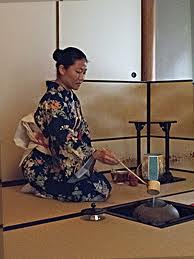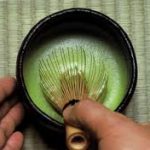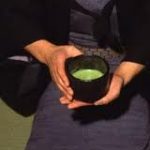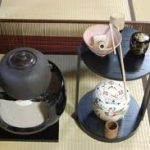 Guest Columnist: Joyce Kubose
Guest Columnist: Joyce Kubose
Popularly known as the Japanese tea ceremony, CHANOYU, the Way of Tea, is a spiritual discipline based on integrating the principles of harmony, respect, purity, and tranquility into one’s everyday life through the simple act of making and sharing a bowl of tea.
Harmony is the oneness of host and guest, of the interplay of the utensils, of all things with nature, and the interdependence of all that comprise the universe. Respect is appreciation, consideration, and humility; it is the sincerity of one’s heart. Only when there is respect can there be harmony. Purity is cleanliness and orderliness, which enables one to sense and appreciate the essence and sacredness of all things. With the constant practice of harmony, respect, and purity in our everyday lives comes tranquility and inner peace. Chanoyu offers a way for these ideals to become a part of us through the practice of making and sharing a bowl of tea. Chanoyu has evolved over the past 500 years and has been instrumental in the development and refinement of Japanese culture and its many arts.
 The type of tea used in chanoyu is called matcha, green powdered tea. There are two types: one that is used to make thick tea, called koicha, and one that is used to make thin tea, called usucha. At a formal tea gathering, the guests are served both types of tea. The tea is prepared in a tea bowl using a bamboo tea whisk. For the preparation of thick tea, a bamboo tea whisk is used to blend or knead the matcha and hot water together to produce a smooth, creamy, rich mixture. For the preparation of thin tea, the bamboo tea whisk whips the matcha and hot water into a very light and frothy mixture.
The type of tea used in chanoyu is called matcha, green powdered tea. There are two types: one that is used to make thick tea, called koicha, and one that is used to make thin tea, called usucha. At a formal tea gathering, the guests are served both types of tea. The tea is prepared in a tea bowl using a bamboo tea whisk. For the preparation of thick tea, a bamboo tea whisk is used to blend or knead the matcha and hot water together to produce a smooth, creamy, rich mixture. For the preparation of thin tea, the bamboo tea whisk whips the matcha and hot water into a very light and frothy mixture.
 The bamboo tea whisk is made exclusively for chanoyu. It is about four and a half inches long and is made from one piece of properly seasoned bamboo from which the skin of the lower half has been shaved, and it is then split into 16 sections. Each section is split again to remove the inner bamboo flesh from the outer skin portion. Each section is split into 10 tines so that there will be 80 tines on the inside and 80 on the outside. Then using a mounted razor, each section is pushed into the razor to cut a thick one and a thin one; and then each section is gently split by hand and tapered on the inside. A thread is woven between the tines, putting the thinner ones on the inside and the thicker ones on the outside, so that in the end there are two circular rows of tines.
The bamboo tea whisk is made exclusively for chanoyu. It is about four and a half inches long and is made from one piece of properly seasoned bamboo from which the skin of the lower half has been shaved, and it is then split into 16 sections. Each section is split again to remove the inner bamboo flesh from the outer skin portion. Each section is split into 10 tines so that there will be 80 tines on the inside and 80 on the outside. Then using a mounted razor, each section is pushed into the razor to cut a thick one and a thin one; and then each section is gently split by hand and tapered on the inside. A thread is woven between the tines, putting the thinner ones on the inside and the thicker ones on the outside, so that in the end there are two circular rows of tines.
Each bamboo whisk is handmade by an experienced craftsman. Each time guests are invited for tea, a new bamboo tea whisk is used. When the whisk can no longer be used, gratitude and appreciation are expressed for its use, for a bowl of delicious matcha cannot be properly prepared and enjoyed without it.
When guests are invited for tea, the host prepares all details with utmost care and consideration. The tea is prepared with the full spirit of the host’s heart and the guests receive the tea with sincere gratitude. There is a spiritual oneness that comes from the meeting of host and guest. Although the form of chanoyu is Japanese, its spirit is universal and knows no boundaries of race, culture, or nationality.
About Joyce Kubose
Joyce Sosho Kubose is an instructor of chanoyu, the Art of the Japanese Way of Tea. She began her studies with the Urasenke Tradition of Tea about 40 years ago and has been teaching for more than 20 years.
She holds a professorship-level teaching certificate (Kyoju). As part of her training, she studied at the headquarters of the Urasenke Tradition of Tea in Kyoto, Japan, for three years as a member of the Midorikai program, the non-Japanese student division of the Urasenke Gakuen Professional College of Chado and graduated with honors. She continued her studies at the Urasenke headquarters for another year as a member of Ichiukai, the Urasenke graduate division.
She has given numerous presentations at schools, cultural events, and various organizations in addition to teaching chanoyu and Japanese culture through private instruction.
She also has a website, which offers matcha/green powdered tea from Koyama-en and Shorai-en tea companies and basic utensils and accessories for the study of chanoyu.
Joyce is a past instructor for the Global Protocol Academy certification program (Chicago Training Center).
Joyce Kubose MATCHAandMORE, Inc.


